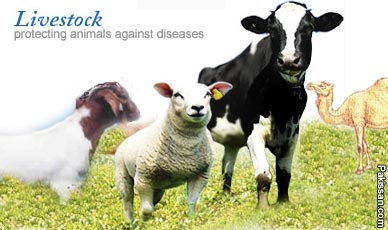|
Livestock market: protecting animals
against diseases
By Dr Baz Muhammad Junejo
 A
VERY big livestock market is set up in Karachi every year
for about a month during Eid-ul-Azha where over one million
animals - about 0.4 million large ruminants and more than
0.6 million small ruminants - are brought from various parts
of the country. A
VERY big livestock market is set up in Karachi every year
for about a month during Eid-ul-Azha where over one million
animals - about 0.4 million large ruminants and more than
0.6 million small ruminants - are brought from various parts
of the country.
Over 60 per cent of these animals belong to Punjab, 40
per cent to rural Sindh and 10 per cent to Balochistan.
These sacrificial animals which are specially fed and
reared are mostly beautiful and fat and fetch high prices.
The Karachi cattle market set
up on the occasion of Eid is one of the largest livestock
market in Asia. As far as large ruminants are
concerned about 0.5 per cent of them are crossbreed of
Frisian and Cherolias which fetch higher prices than local
animals. Some animals are sold for more than a few hundred
thousand rupees each.
Local animals reared specially for sacrifice mainly in
Punjab and surrounding areas are Cholistani Dajal and Dhani
breeds; in Balochistan are Bhaghnari; and in Sindh are
Tharparkar and Kankrej breeds.
As these animals come from every part of the country, the
owners who are familiar with foot-and-mouth disease and
conditions prevalent at the livestock markets get their
animals vaccinated.
But new farmers or the farmers coming from far-flung areas,
where there is no such facility, or the farmers who are not
familiar with the disease and its losses, and the traders
who purchase animals one to two months prior to the festival
do not vaccinate their animals which are prone to the
disease.
After reaching the market these animals may get infected
with the disease and spread it to other healthy animals.
Foot-and-mouth is a viral disease which is highly
infectious. The main symptoms of the disease is high fever
(104oF to 105oF), vesicles on tongue, gums, dental pad,
inner side of lips, mammary glands and foot with dribbling
of saliva from mouth.
Some times the saliva is blood-stained and the animal is
unable to eat and walk.
Especially the foreign crossbreed animals are highly prone
to such disease.
The conditions which
favour the outbreak of this disease are cold weather
mainly the months of November, December, February
and March, stress on animals, over crowding of the
animals, keeping animals in hard and hilly areas,
unsanitary conditions, areas infested with flies and
mosquitoes, non-availability and shortage of fresh
and clean water, supply of hard and dry fodder or
spoiled green fodder containing fungus and keeping
the animals standing for a long period in open space
without any shelter.
Fodder contaminated with concrete and mud inflicts
injuries to the tongue and mouth of the animal while
consuming food which usually results in the
infection.
In case of outbreak of the disease, heavy losses are
suffered by the cattle traders as the sacrificial
animals become weak, loose weight and beauty and do
not attract buyers.
Many of the animals also die of this disease. The
sign of the disease in a bigger market is very
clear.
If the crossbreed animals show symptoms of the
disease first, it is obvious to be a foot-and-mouth
disease, and soon the local animals of the market
also get infected with this viral disease which, if
not controlled, soon assumes epidemic proportion.
The disease is contagious and spreads very rapidly.
Protection against the disease: A comprehensive plan
is needed to control the disease.
The area of the market should be separated into
blocks and given numbers.
Each block should be allowed to accommodate only
1,000 animals to make it technically easy to look
after them.
At the entry points of the cattle market shallow
ditches should be made and filled with formalin
solution with a concentration of three per cent to
four per cent or copper sulphate solution four to
five per cent so that animals and workers while
entering into the market pass through this solution
which kills the pathogenic organism.
The foreign crossbreed animals should be kept away
from the local breed; the premises should be kept
clean, hygienic and sprayed with disinfectants daily
to kill mosquitoes, flies and bugs; clean wooden
mangers should be used for feeding the animals and
they should be cleaned daily.
Animal waste and other garbage should be removed
from the premises.
The animals and traders should be provided with
sheds and clean and fresh water.
Fodder should be protected against contamination
specially mud and concrete particles.
The market managers and head of the veterinary
department should work in close coordination to
control any epidemic. For full animal health cover,
one veterinary aid centre fully staffed and equipped
with a sick ward per 10,000 animals should be
established, and one mobile unit working 24 hours
should be set up. In case of any disease, the sick
animals should be segregated from healthy one and
kept in sick ward and treated accordingly until
cured.
In case of symptom like foot-and-mouth disease and
vesicular stomatitis (same symptoms like
foot-and-mouth) the animal in addition to mouth wash
with alum solution, should be treated with
antibiotic or sulpha drugs.
Protection of animals against such diseases at
livestock market is necessary to save both the
cattle sellers and buyers from losses and preventing
the disease to assume an epidemic proportion.
Courtesy:
Dawn News
|
Pakissan.com;
|